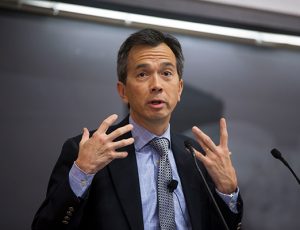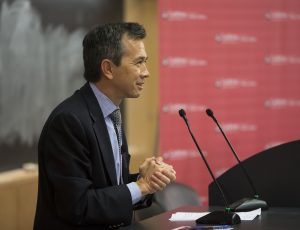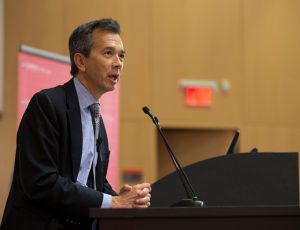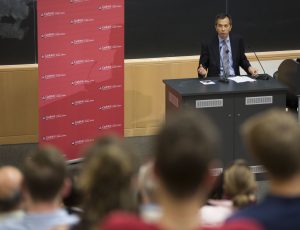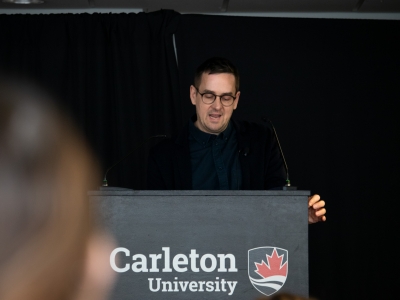
According to Gregory Ip, the recent rise of nationalism didn’t begin with Brexit or the election of Donald Trump, but with the 2010 election of the nationalist Viktor Orban in Hungary. That was followed by the rise of the Law and Justice Party in Poland, the election of a Hindu nationalist in India and increased nationalist rhetoric in China.
“This has been a revolt against the economic order, against globalism and elite opinion,” said Ip, who spoke to a large audience at the Faculty of Public Affair’s Currents Lecture on September 15. “The election of Donald Trump was a manifestation of that.”
As the Chief Economics Commentator at the Wall Street Journal, Ip has tracked Trump’s rise— and economic arguments—closely.
“In the run-up to the election, people were concerned that trade was an area where the president would exert full power. But what he discovered when he threatened NAFTA was that all of these interests, such as state governments and Chambers of Commerce, started fighting back,” explained Ip, who has written a number of books, including Foolproof: Why Safety Can Be Dangerous and How Danger Makes Us Safe. “Trump has discovered that economics is a world of trade offs with unintended consequences.”
Nationalism in Canada
In contrast to the U.S. and Britain, Ip noted that Canada has yet to see a rise in anti-globalist, nationalist sentiment.
In part, he credited the lack of controversy in Canada over immigration. This, despite Canada’s acceptance of 25,000 Syrian refugees in 2015 and 2016. Ip pointed to Canada’s immigration system, which prioritizes an applicant’s job skills, education, and language fluency.
“Canada has a sense of control over its borders, in part because it doesn’t share a border with a country like Mexico,” acknowledged Ip. “The U.S. has a much higher proportion of illegal immigration. Plus, it emphasizes family ties over education or job skills.”
However, Ip said it’s too soon to tell if Canadians are truly immune to the nationalist trend. He advised the audience to keep an eye on events south of the border.
“Canadians could learn a lot from what the United States has gone through,” he said, adding: “But the United States could definitely learn a lot from what Canada has done right.”
Greg Ip was named one of the Faculty of Public Affairs’ 75 for the 75th in honour of Carleton University’s 75th anniversary.
Wednesday, September 20, 2017 in Currents Lecture, News
Share: Twitter, Facebook
